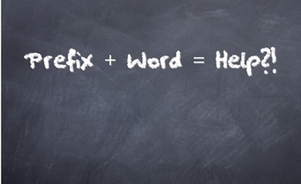 We received a punctuation 9-1-1 yesterday, asking whether or not to hyphenate the prefix "re-."Our answer was, basically, "It depends." The modern aesthetic tries to be a bit critical about when to hyphenate, so that there are not superfluous hyphens eating up real estate on our pages, nor stopping the eye in its course of reading. For the same reason that Write and Polish eschews the serial or "Oxford" comma as unnecessary, we appreciate this style trend. What it means, however, is that not every case is the same. Generally, attach prefixes (and suffixes) to their respective roots, as in nonprofit, semiconscious and multinational. Exceptions — use a hyphen when:
This set of exceptions is not exhaustive, but considers many of the cases that the average person will encounter. If a specific situation with which you've struggled is not addressed here, you may need to consult a dictionary or a style manual appropriate to your business or pursuit. You may also always contact us for clarification or to research a specific language challenge! * As it fell out, yesterday's query turned on that we were instructing someone to "retell a story." So, no hyphen!
0 Comments
Holiday punctuation 9-1-1 received today: Oh, Guru of Grammar, I'm writing our holiday cards and I'm stumped. Should I use dashes or commas? "We've had a rockin'-awesome-crazy-wonderful-fantabulous-extraordinary-superb kind of year."
The answer in this example is to use commas. The dashes join a string of words or a whole phrase into a single word, for syntax/punctuation purposes. But you're just using a lot of modifiers as themselves...a string of modifiers. So, separate them with commas! The example I like to use is: She got that creepy, shivery, something's-under-the-bed feeling.... See how you have an example of both adjectives separated by commas and another set of words connected by hyphens to behave like another adjective in the list? Note: Adjective = a word that describes (or modifies) a thing 10/6/2009 2 Comments Writing Tip: The Multi-Talented Hyphen -- it slices, it dices, it makes julienne fries!It doesn't quite do all of that, but it is a busy little piece of punctuation.
The most basic function of the hyphen is to indicate linkage of two (or more) things that would otherwise be separated. Thus, its most common use is at the end of a wrap-around sentence, in which a word is broken between syllables. The hyphen also acts to group words that normally appear separately, but are being treated as a single entity. For example, fractions (one-third, four-fifths), compound adjectives (private-sector employment, the 22-year-old candidate) and many compound words that would otherwise join with identical letters (co-operate, re-emerge). One of the most common areas where confusion arises is when a word or phrase can be used one way without the hyphen, and another way with it. "Thank you" is a frequent example. To explain why requires a quick review of some basic parts of speech and what they do in a sentence. A sentence has to have a subject (generally stated, but in this case, sometimes implied) and a verb (action). It often has something that receives the action or that explains it further (object -- either direct, indirect or prepositional -- but that's more than you need to worry about right now!). When I write "thank you for your help," the implied subject is "I" -- the meaning is that "I" am doing the action of "thanking" and the recipient of that action is "you". "Thank" and "you" are doing very different jobs. But, if I want to explain that "I sent thank-you notes to the people who helped me," it's an entirely different situation. "I" am still the subject, the action is "sent". "Notes" is the thing that was sent, and by way of giving more information, the type of "note" has been described using an adjective, in this case two words that are behaving like just one, by way of our friend, the hyphen, that links them, "thank-you." Other examples: "the mayor was ill-at-ease," "I need to pull out that tooth" v. "the troop pull-out went without incident," "the first-time traveler" v. "the first time-traveler*," and "the book she read left her with that there's-something-under-the-bed-that's-about-to-grab-your-ankle feeling." One further application is the suspensive hyphen: when a series of similar phrases are used as adjectives, the suspensive hyphen allows the writer to eliminate repetition -- "the annual report included the one-, three-, five- and ten-year performance of the company's stock." * Courtesy of Business Grammar, Style & Usage by Alicia Abell, p.34 |
Write and Polish BloggersChristie Manussier, principal Writer and Polisher, is the usual news reporter. CategoriesAll Abbreviation Academic Acronym Adjective Adverb Anachronism Anagram Apostrophe Application Article Banished Biography Blend B.N.I. Boldface Brochure Bunnies Business Business Plan Capitalization Children's Literature Christmas Church Comma Common Mistakes Construction Contact Management Content Contest Cross-sell Databse Differentiators Donation Double Negative E-mail Entertainment Etymology Event Coordination File Format First Reference Flyer Fundraiser Giggles Gold Star Grammar Day Grant Proposal Haiku Health Care Homophones Hyphen Idiom Images Italics Law Firm Magazine Manual Marketing Maternity Leave Metaphor Myth News & Announcements Newsletter Non Profit Non-profit Noun Numbers Of Snakes And Presidents Parts Of Speech P.D.F. Plural Poetry Portmanteau Poster Powerpoint P.R. Preposition Press Release Projects Pronoun Proofreading & Editing Punctuation Quotation Marks Quotes Real Estate Recommended Reading Reflexive Research Resources Restaurant Retail R.F.P. R.I.P. Shakespeare Slideshow Social Media Spelling Style Manual Synonyms Syntax Template Tenses Testimonial Thesaurus Training Manual Translation Travel Twitter Underlining Verb Video Vocabulary Website Why The World Needs More Proofreaders Winter Word Of The Day Writers Writing Tip Archives
March 2015
|
Search by typing & pressing enter

 RSS Feed
RSS Feed